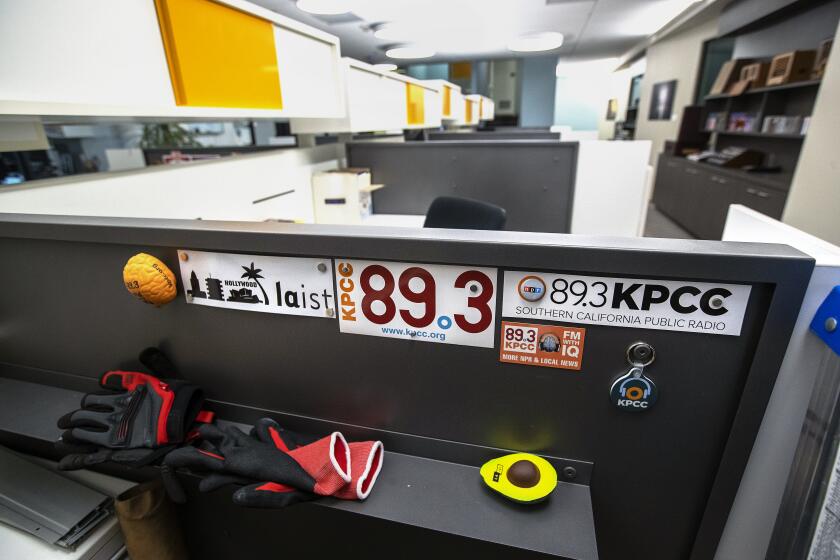Coming Out of His Shell
Like many a good capitalist, Isaiah Phillips launched his career with a small white lie and a part-time job. He was 12 and big for his age, and he told a guy he was four years older so he could get a gig as a Ninja Turtle at a kid’s birthday party. His best friend told him all you had to do was say “Cowabunga” and they’d pay you $13 an hour.
This was 1990, two years before the L.A. riots. He lived with his mom and little brother in the Crenshaw district. Not many $13-an-hour jobs there then. Once he found one, he hung onto it like a pit bull in turtle clothing. After the first few parties, all those magic tricks and balloon animals were fun.
Still, you can’t make a career out of being a birthday turtle, right? And after the L.A. riots, Phillips stumbled onto his next chance.
Having missed the looting and burning (at the first sign of trouble, his mom had whisked the family away for “a little vacation”), he had come back for the recovery. Job-training programs were sprouting in the ‘hood like little green buds after a brush fire. There was a rumor you could get on at UPS and be a deliveryman--with benefits, even--if you signed up for a particular post-riot program at school.
This Phillips did. The instructor assigned him to an auto parts business. He worked for classroom credit and minimum wage. He learned about resumes and computers and how to act with an employer. Something in him began to take itself seriously.
Then he heard about a $4,000 scholarship you could get, “and all you had to do was write about your life.” Phillips wrote, won the money and finally got that dream job at UPS.
Imagine his confusion when he discovered that he felt stifled. Imagine his fear when a voice out of nowhere whispered: Isaiah . . . What if YOU were the boss?
*
What makes a self-made man or woman? For that matter, what makes a person become the sort of employee a self-made man or woman might like to hire? These are big questions at this moment in the bumpy history of Southern California-style capitalism. From the post-riot job programs that have dotted the local market for much of this decade to the emerging juggernaut of welfare reform, there has never been more urgency to the search for some sort of formula that will turn reticent people into go-getters, into souls transformed.
Over the years, that search has generated a lot of good ideas, and a lot of reckless mush. I remember sitting in the mid-’80s with a roomful of welfare mothers in downtown L.A. while a motivational speaker told them that any time they had a negative thought about their abilities, they should just close their eyes and shout: “Cancel! Cancel!” The poor women gave it their best shot and speculated afterward that the speaker was nuts.
One thing that’s coming out, though, according to the experts, is that this business of upward mobility does have more psychology to it than people think. The programs for what the social workers like to call “disadvantaged” people that seem most successful--programs like the environmentally focused L.A. Conservation Corps, for instance, or YouthBuild, in which poor kids build their self-images by building housing in their communities--seem to have some intangible something; besides job training and education, they help the participants see themselves in a bigger way.
Phillips believes that, were it not for the woman who ran his job-training program, he might never have heard the inner voice that has opened up his aspirations. The woman, Melba Jackson Carter, executive director of the Shell Youth Training Academy, says that, in fact, Phillips was more confident than he realized. Carter singled him out for encouragement, she says, because “there was a light in this kid, and if he got into the program, I knew there was no end to where he could go.”
*
It turned out that Phillips never could quite bring himself to give up that birthday party job. As he got older, he handled more and more for the owner--photography, sound, scheduling. “Finally it dawned on me that they were charging $125 an hour and I was getting, like, $20,” he remembers. Last year, with guidance from Carter, he went into business for himself.
Now--between classes at community college--he is the Crenshaw’s own Homeboy the Hip-Hop Clown. From Pasadena to the projects, his Just Clowning Entertainment does a brisk citywide business, offering “the downest clowns around.” His fliers offer magic shows, face-painting, high jinks, dance music and balloon animals for kids. Last time I checked his list of services, though, there were no Ninja Turtles on the list.
Shawn Hubler’s column appears Mondays and Thursdays. Her e-mail address is shawn.hubler@latimes.com






